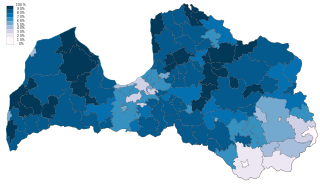The Democratic Party is a center-right party in Bulgaria led by Alexander Pramatarski. The party is a member of the European People's Party (EPP).

Constitutional Assembly elections were held in Latvia on 17 and 18 April 1920. The Latvian Social Democratic Workers' Party emerged as the largest party, winning 57 of the 150 seats. The elections were boycotted by communist parties. The Constitutional Assembly was responsible for drafting a constitution, which was approved on 15 February and promulgated on 7 November 1922.

Parliamentary elections were held in Latvia on 7 and 8 October 1922. The Latvian Social Democratic Workers' Party remained the largest party, winning 30 of the 100 seats.

Parliamentary elections were held in Latvia on 6 and 7 October 1928. The Latvian Social Democratic Workers' Party remained the largest party, winning 25 of the 100 seats.

Parliamentary elections were held in Latvia on 3 and 4 October 1931. The Latvian Social Democratic Workers' Party remained the largest party, winning 21 of the 100 seats. The last elections held under the Constitution of Latvia before the 1934 coup d'état, they were the last competitive elections held under Latvian law until 1993.

The Liberal Party, also known as the Radoslavists was a political party in Bulgaria from 1887 until 1920.
The People's Party was a political party in Bulgaria between 1894 and 1920.

The Latgalian Farmers Party was a political party in Latvia representing the interests of Latgale farmers during the inter-war period.

The Democrats Union was a political party in Latvia in the inter-war period.

The Workers' Party was a political party in Latvia.

The Latgalian Christian Peasant and Catholic Party was a Christian centrist political party in Latvia during the inter-war period. It was the largest party in the Latgale region, and was led by the bishop Jāzeps Rancāns.

The Christian National Union was a political party in Latvia in the inter-war period.

The Zionist Party, also known as the Ethnic Socialist Party, was a centre-left Jewish political party in Latvia during the inter-war period. It was led by Max Lazerson.

The Jewish National Bloc was a political alliance in Latvia in the 1920s. It consisted of Histadruth Hacionith, the Jewish National Democratic Party and Mizrachi.

The Latgale People Party was a political party in Latvia in the inter-war period.

The United Polish Parties, officially the Educational and Charity Associations of Riga and the Polish Association in Latvia, was a political alliance in Latvia for Latvian Poles during the inter-war period.

The Non-Partisan Landless Farmers, officially the Group of Latvian Non-Partisan Landless and Small Farmers, was a political party in Latvia in the early 1920s.

The Committee of the German-Baltic Parties was an alliance of Baltic German political parties in Latvia during the inter-war period. Its members included the German-Baltic Democratic Party, the German-Baltic Progressive Party, the German-Baltic Reform Party, the German-Baltic People's Party, the German-Baltic Integration Party, the German-Baltic State Party and the Voters Association of Mitau.



